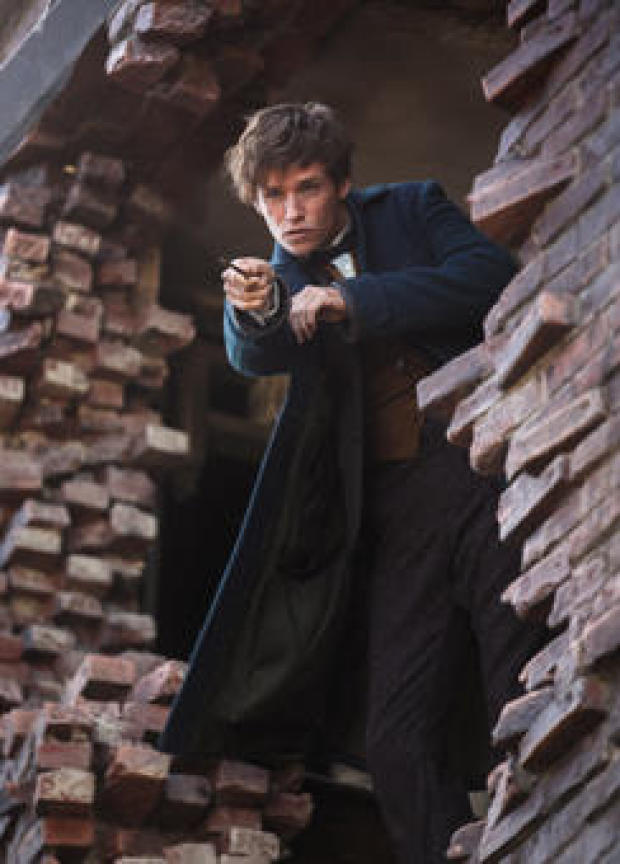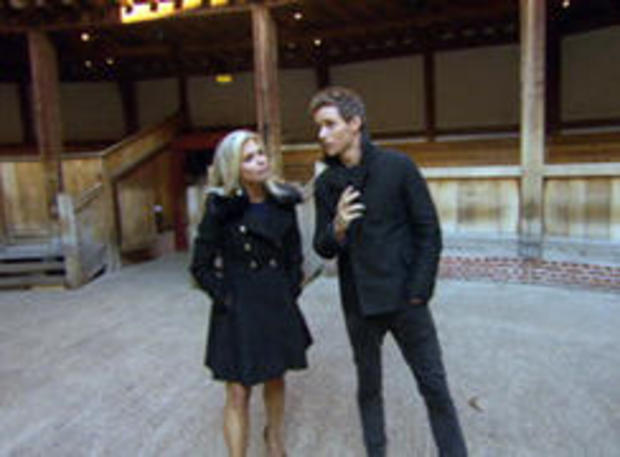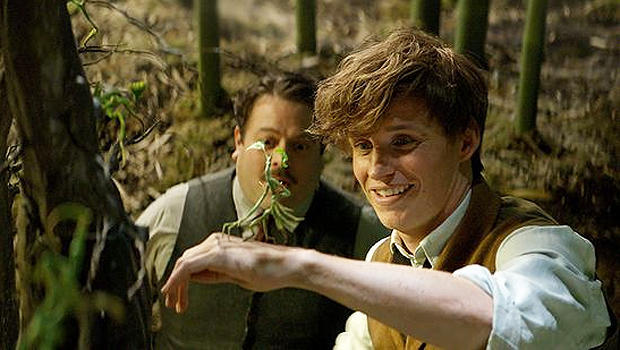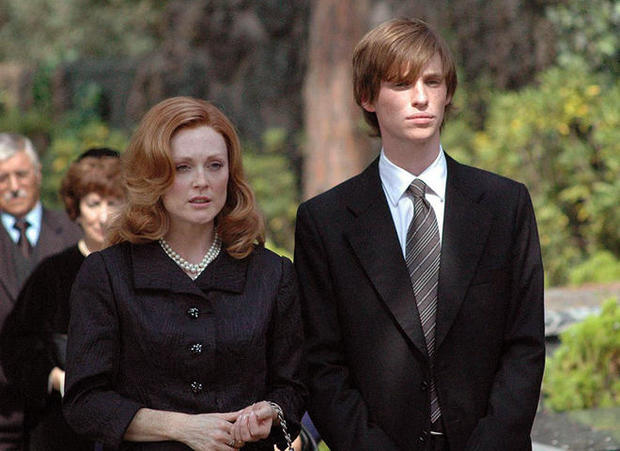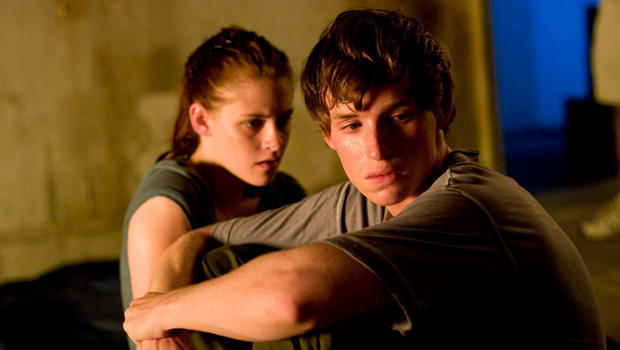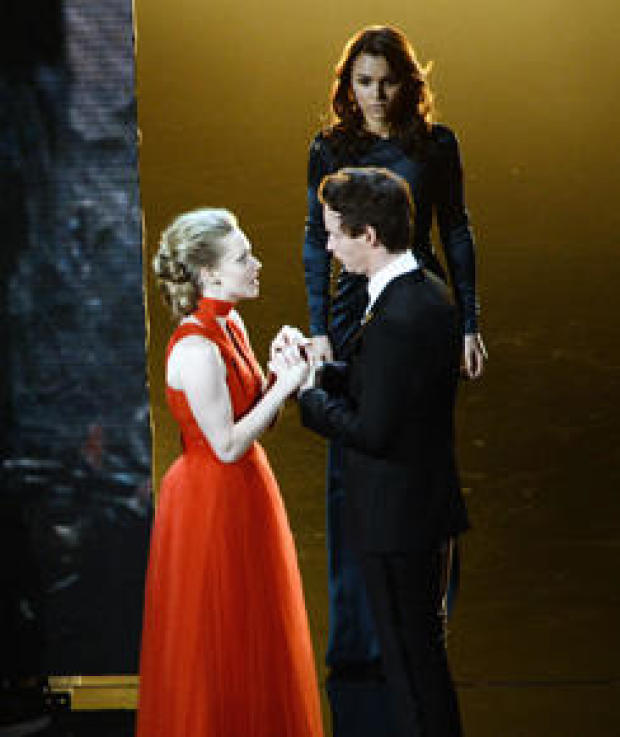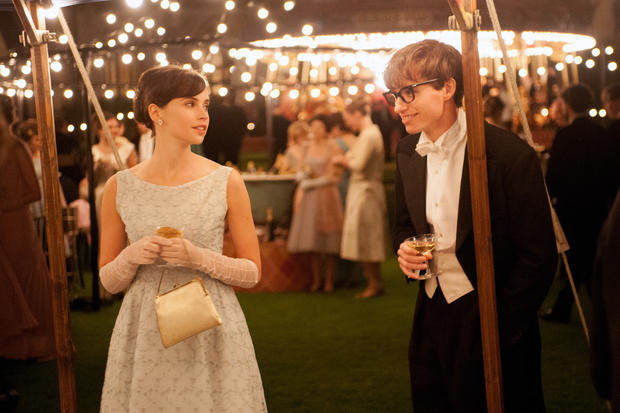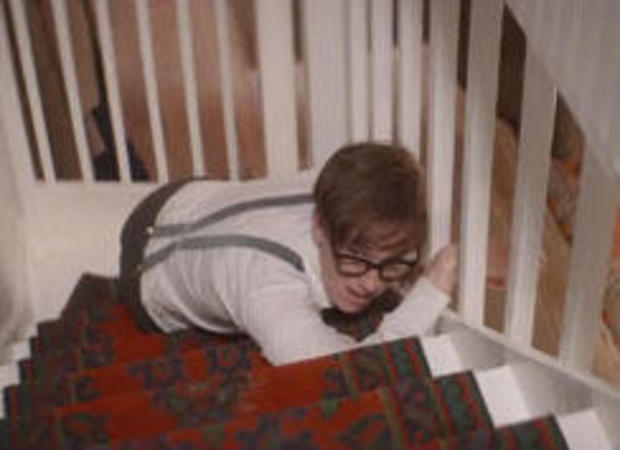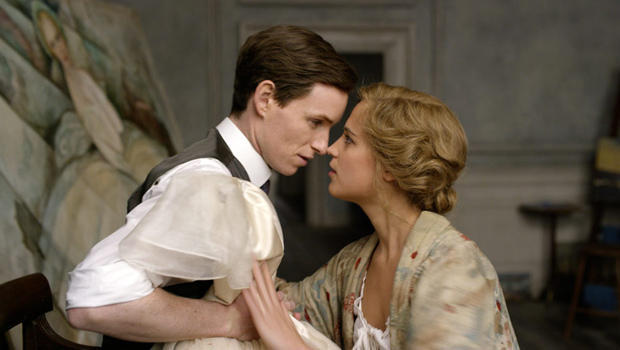Extended interview: Eddie Redmayne
In this extended interview transcript, the Oscar-winning star of “The Theory of Everything,” “The Danish Girl,” and the J.K. Rowling fantasy, “Fantastic Beasts and Where to Find Them” talks to correspondent Tracy Smith about his career, playing real-life characters, award season, fatherhood and changing diapers.
TRACY SMITH: So let’s talk “Fantastic Beasts.”
EDDIE REDMAYNE: Let’s!
TRACY SMITH: Do you get the sense that people are eager to see this movie?
EDDIE REDMAYNE: You know, the moment that I got a sense that people were excited was when I went to Comic-Con. Now I’d never been to Comic Con. I’d heard a lot about Comic Con before. And we went to show a sort of new trailer of it. And I walked into this huge auditorium of thousands of people. And there were people dressed up as Newt Scamander, the character that I’m playing, which I found sort of uncanny and weird and exciting (Laughs) and kind of bizarre all sort of rolled into one. So that was an exciting moment. I feel like J.K. Rowling’s world is one that is owned by everyone in some ways. People have grown up with it and have such a sense of that universe that there’s something kind of wonderful seeing everyone get involved.
TRACY SMITH: Is it a little intimidating, too?
EDDIE REDMAYNE: Endlessly intimidating (laughs), yes! It is intimidating because I love the Potter films. I found them the most wonderful sort of escapism every year or two. It was a sort of magical place to dive back into. And if you’ve loved something and then in some ways you become a part of it, you just don’t want to be the one that screws it up!
But that being said, I think that pretty much every part I’ve played you always think is the most intimidating, whether it was with playing Stephen Hawking -- I knew that Stephen would see the film and Jane, his first wife, would see the film, it was their story. And so that felt pretty intimidating. And then it’s about other people’s expectations. But I think it’s good -- it helps make you work harder.
TRACY SMITH: Do you have those moments of self-doubt where you say, “Oh, I can’t pull this off”?
EDDIE REDMAYNE: Frequently. Yeah,
TRACY SMITH: Does fear motivate you?
EDDIE REDMAYNE: It’s definitely an aspect of it. Yeah. Kind of fuels you with adrenaline and all those nerves, all those things that kind of keep you on edge keep you super-engaged and sensitive and responsive. Certainly it makes you work harder. The fear of messing up is what makes you work harder!
Actors who perhaps are super-confident and have absolute belief in themselves I always admire, because I can’t really be like that. Because you never know what’s right, what you feel inside versus what is portrayed. The depiction of the exterior as opposed [to] what you’re feeling inside is always so different that it’s impossible to know what is right.
But I find that what doubt does, or fear, is it makes you come up with as many ideas as you possibly can. And on film that works ‘cause you’re then handing over that fear to the director, who has to make sense of all those options!
TRACY SMITH: Makes sense. So in “Beasts,” these beasts are computer-generated. How do you pull that off?
EDDIE REDMAYNE: Well, what I found kind of riveting was, I thought when I joined this film that there would be people [who] go, “Well, this is how it’s gonna be done.” But the amazing thing about director David Yates and David Heyman, the producer, is -- despite the scale of these films, and they worked on many of the Potter films -- there is an intimacy to the creation of it that feels really collaborative.
J.K. Rowling wrote this script and yet she allowed us to come up with ideas. So when it came to the beasts I remember David Yates saying, “Well, why don’t you spend a few weeks, months working out what would be best for you?” I ended up working with all sorts of puppeteers. Some of the guys who had worked on “War Horse” came up with huge puppets.
And then sometimes there were actors dressed in green-screen things for me to interact with. And then sometimes it was just imagining. There’s one little guy called Pickett who is a Bowtruckle. I kind of adore him. He’s a sweet little stick insect figure. And they made a little wire puppet for me to rehearse with. So I did a couple of weeks’ rehearsal. Then in the end I would just sort of imagine he would stand on my hand. And I’d just find myself on the tube, on the subway kind of gently talking to imaginary figures!
TRACY SMITH: You were doing it on the tube?
EDDIE REDMAYNE: Yeah. But there was something so wonderful about this film, about jumping into that kind of imagination you have as a child [like] talking to your teddy bears or your imaginary friends or your dog or whatever it is. That made it a huge amount of fun.
TRACY SMITH: Speaking of childhood, tell me about growing up. Your parents are not show business people.
EDDIE REDMAYNE: They’re not show business people. No. They are not. My mom worked in relocation, and my dad was working in the city. And they sort of had this child that was interested in theatre and music and, I suppose, art. They weren’t necessarily things they were incredibly familiar with. But they were deeply supportive of my interests, and from an early age. From when I was 12 or 13 I was loving theatre. And they took me to the theatre a lot. They really encouraged it, which I kind of at the time just totally took for granted. But I look back on and think it was very supportive. My parents and my brothers and sister are my bedrock in some ways, as well as my wife, my little baby.
TRACY SMITH: And none of them are really in that show business world.
EDDIE REDMAYNE: They’re not. But they find it riveting (laughs)! They just sort of come along and they’d be very supportive. I mean, I’ve put my parents through their paces. One of the early plays I did was “The Goat,” which was written by the late Edward Albee. And there was a moment in it in which my character was playing Jonathan Pryce’s son. And there was a moment where this character’s so sort of lost that he ends up kissing his dad. And so my brothers would come with my dad to watch the play in order to watch my dad’s reaction, as I was having to kiss my father on stage.
And then similarly I did a film called “Savage Grace” with Julianne Moore, true story about the Baekeland family, and this son who may have had an affair with his mother. And so my brothers would come to watch my mother’s reaction! So they got a lot of joy I think from watching me put my parents into sort of awkward circumstances.
TRACY SMITH: But through it all your parents supported this dream of yours.
EDDIE REDMAYNE: They did. Yeah, they really did. There are occasional questions, because it’s such a precarious trade and all the statistics of employment are real. So many people are so passionate about acting that it’s quite a competitive world, that [in] early stages when I was struggling to get work “Have you thought about producing?” would always be the thing that my dad would say. Little does he know that producing is incredibly difficult and very few people make money in that as well! I remember also my mom, when I was younger and I was showing interest, that perhaps if you get knocked by bad reviews and stuff she would see that it would hurt a bit. And she’s like, “Darling, have you thought about becoming a lawyer? I mean, lawyers are basically actors. It’s the same thing.” And she would occasionally repeat this. And I’ll be like, “Mom, have you ever seen me win an argument?” And she’d be like, “No.” I’m like, “So…?” (laughs). I mean, that’s kind of requisite for being a lawyer is you have to in some ways be able to win an argument!
TRACY SMITH: Although if you think about that, you won that one with your mother!
EDDIE REDMAYNE: Well, maybe! Slow burn (laughs)!
TRACY SMITH: So it’s interesting you say you struggled starting out. You had a comfortable upbringing, went to great schools, and success came fairly early. I think some people might look at it and say it was easy.
EDDIE REDMAYNE: Well, they would be right in the sense that compared to many actors I’ve had a remarkably lucky and easy run of it. But you feel the struggles. I was working in a pub for a while, going and auditioning, endlessly auditioning for things on camera and not getting them because I hadn’t got into acting through theatre really, and had no idea about film. I think it was about three or four years before I got anything properly on screen.
TRACY SMITH: So you went to audition, audition, audition. And what happened?
EDDIE REDMAYNE: You’d sort of get feedback from your agents -- he was trying to soften a blow. But it became clear -- I’ll never forget, I think my first film ever was with Toni Collette who I think is extraordinary. And we were making this film, and the first scene, it was kind of “Silence of the Lambs”-y style. She was my psychologist and I was this sort of psychopathic boy. And the director had said, “You can’t watch playbacks.” So you couldn’t watch yourself back after shooting, which often directors say, because it can instill a vanity, or the actors can get too self-conscious.
And I was doing this scene with Toni Collette. And after an hour of shooting she was like, “Ed, should we go and watch the playback?” And I was like, “Oh no, no, no. I’m not allowed to.” She was like, “Oh come and watch the playback. Come on. You should come and watch.” I’m like, “No, I really can’t.” She’s like, “Come and watch the playback.”
So I went and watched the playback. And thank God! Because I was used to playing audiences like The Globe, these massive things. And my eyebrows were doing THIS! I was completely overacting. It was pretty dismal. And so it started an education in film.
I’ve never been someone that was sort of blessed with an innate talent of just being able to do things. I had to work at it and learn from mistakes.
TRACY SMITH: Because to us it looks like you’re not working.
EDDIE REDMAYNE: If you go and look at some of those early films you’ll be absolutely sure that that’s not the case. I really have to work. And it remains that way. I can’t coast at all. Otherwise you see it, and it looks pretty bad.
TRACY SMITH: Even now, you think?
EDDIE REDMAYNE: Massively so. I remember when I was at university I would sort of get through doing weekly essays, and they would be fine, they’d be okay. And then at the end of the first year at university I did a big, large essay on Brâncuși, a sculptor. It was on a tiny aspect of his work. And for one moment you become, like, the world knowledge on this tiny thing. And what it forces you to do is, you you take pride in that and you feel great. And so when I started doing essays after that, you didn’t wanna go back to those kind of slightly boring generic ones.
And I’ve certainly felt that in acting as well -- to really put months and months and months of work into it. Then when you go back you want to keep up that process I suppose, that same work ethic.
TRACY SMITH: So you go very deep into your roles.
EDDIE REDMAYNE: I don’t know about “deep.” Everyone has a process. And I suppose over ten, 12 years I’ve just gently developed what works for me.
TRACY SMITH: And what is it?
EDDIE REDMAYNE: What it is, is having time, really, [which] you’re not allowed. Firstly, if you’re not lucky enough to be in a position which you can say, “I need four months to prepare for this.” Most films would not allow that. Also if you’re not playing the lead in something, they’d be like, “Don’t be ridiculous.”
Or if you need to make ends meet and jump from one job to another, you don’t have that facility. But certainly on “The Theory of Everything,” there was no question that I had to do the research beforehand. I asked that of James Marsh, our director, and he allowed me that. From then I’ve tried to retain that with each film I do, to have a certain amount of time to sort of get under the skin of it.
But that’s also because I can’t wing it. I know friends and actors who can -- not “wing it,” but come with a much more spontaneous facility, whereas for me I have to have done all the prep in order to forget about it and just relax in front of the camera.
TRACY SMITH: You need to have that research time, that work.
EDDIE REDMAYNE: I need to have all that time in order to then hopefully think that that’s embedded in you somewhere, even if you’re not conscious of it, that it sits somewhere in your stomach. So when you’re playing opposite Felicity Jones or Alicia Vikander or Katherine Waterston in “Fantastic Beasts,” you can just be free. Or the imaginary creatures in “Fantastic Beasts”: I don’t want to simply have to imagine, you know? You can see it in my eyes if I’m going, “Wait, where is Bowtruckle? And Niffler?” You’ve got to have absolute faith in what those relationships are. Even though it sounds ridiculous when it’s with these imaginary creatures, you kind of have to put all that work in; otherwise it looks very silly.
TRACY SMITH: Getting back to the early days, when you were out auditioning for parts and not getting [them]. Talk about some of the struggles.
EDDIE REDMAYNE: I’d auditioned for “Savage Grace,” this film with Julianne Moore, directed by Tom Kalin. It was a naughty little script that I just loved, and I’d auditioned for. And I’d got the part. They’d been spending ten years trying to make this film and the financing fell through. And then the following year or six months later I was working in the pub. And I remember the manager of the pub was also an actor. And he was like, “Oh, I’ve got an audition for this film, ‘Savage Grace.’” And I was like, “Wait, wait a second, I thought I sort of had that part last year. But it’s clearly gone.” And we called up my agent. And they were like, “No, you’re not financeable enough. Your name isn’t bankable.” I was quite stubborn. And if I get jolted down an inner-steel kicks in (laughs). I cared about it too much to take.
So I sort of basically thrust myself back into the room with Tom and flew over to New York where it was casting and auditioned, and then in the end auditioned with Julianne, and got the part again. I’ll never forget it ‘cause I was making “Elizabeth: The Golden Age” with Cate Blanchett. And I thought I had this part. And then got another call saying, “No, the financiers in France have said they won’t accept it.”
And it became this battle in which you were totally aware of the fact that you’re a commodity. Either you’re just a commodity who’s not bankable enough, or there is someone who doesn’t agree. It’s beyond the creative people. It’s into a money place.
And I’ve had that continuously in my career. And it ended up being Julianne Moore who fought for me for that part. And one of the most amazing things about winning [the] Oscar for “Theory of Everything” was that Julianne Moore won for her film [”Still Alice”]. And then both of us backstage completely shell-shocked, she was like, “Now maybe someone will see “Savage Grace” (laughed)!
You have to be tenacious. Even for someone like me who has had it very lucky, the things you want, you’re always having to shapeshift and keep persuading them.
TRACY SMITH: Still?
EDDIE REDMAYNE: Absolutely.
TRACY SMITH: Did you have those days where you were sleeping on people’s couches?
EDDIE REDMAYNE: Yeah. My parents live in London. So one of the great things when I was starting out as an actor was having somewhere to live rent-free in London, which a lot of young actors don’t have. And the cost of living in London is so insane that I was very grateful for that. But whenever I went over to America, you’ll find there are a lot of English actors or British actors in Los Angeles around January, February. It’s called “pilot season.” But also it happens to be pissing with rain in London (laughs)! Everyone uses it as an excuse to go. “I’m going to try and get some work in Los Angeles” (laughs). And-- so I used to go and I would stay on friends’ floors or stay with my agent, and rent places with pals who were doing the same thing. And I look back on it as a really romantic time.
But I think the reality was slightly less romantic! Endlessly stuck in traffic jams doing weird American accents down the freeway. Either an hour early or three hours late to an audition. Turning up and there being sort of 30 better-looking versions of you who could do the accent substantially better. And so, yeah, it was very funny. But, again, wonderful. Within the same day you’d have four different accents of different things that you were doing. You had no idea really what you were doing. But I always say to young actors, it’s using that experience to try things that were beyond your frame of reference or beyond what you would normally be cast as, those ones which were completely absurd and you’d never get cast in were kind of the most fun because there was no chance you were gonna get it, so you could go all-out to try and do something, or learn from it.
TRACY SMITH: Makes sense. These early films, you were cast with some huge stars: Julianne Moore, Angelina Jolie? Were you cowed?
EDDIE REDMAYNE: Honestly, yes. Particularly on “The Good Shepherd,” which was the most extraordinary opportunity and experience to make. It was a film directed by Robert De Niro. It was about the embryonic C.I.A. And every actor you’ve ever dreamt of working with was in that film. I was playing Angelina Jolie and Matt Damon’s son grown up. And I couldn’t quite believe I’d been cast in it. I’d only done one film before it. And I remember flying business class to New York, [being] put up in an amazing hotel. And you drove in a blacked out car to set in Brooklyn.
And outside the set there would be paparazzi. And you’d go inside the studio and there were these massive sets. You just saw money being spent everywhere. And there was Angelina Jolie and Matt Damon who couldn’t have been more kind, but I was completely star struck.
And then Robert De Niro -- who, again, was wondrously generous. But then suddenly there was a camera two inches from your face. And it was, like, “And GO!” (laughs) Fear scored across my face. It was trial by fire in some ways. I learned so much from it. And you met these amazing people, and you do learn from each of them, not only acting things. And at that point I was really like a sponge because I’d done so little film. I was trying by osmosis to pick up as much as I could from brilliant actors around me. But also, how to behave -- silly things, like on film sets the days are so long, they’re so truncated, the chronology of the way you shoot is all over the place. You go through adrenaline highs and lows. You can be totally ready for your emotional close-up. And then they call lunch break because of the hours that have to be worked. You were right there, ready to go for it. And then you suddenly go and eat a bowl of pasta. And then you come back, exhausted after lunch. And they’re back into your close-up. And so you watch people navigate that. And I tried to be a bit of a fly on the wall. And still do, actually.
And what’s riveting now is it’s not just those older actors. It’s the younger actors who you admire, you see how they’re working and continue to sponge it all up.
TRACY SMITH: You mentioned you learned how to behave. You have a reputation for being one of the nicest actors in the business.
EDDIE REDMAYNE: I hate that word.
TRACY SMITH: “Nice”?
EDDIE REDMAYNE: Nice is so boring (laughs). But I’d rather “nice” than “reprehensible”!
TRACY SMITH: Do you make a point of being nice? Is that important to you?
EDDIE REDMAYNE: What is important is for me to do my best work on camera. The camera is inches away from you and sees every micromovement of every muscle of your eye. And if you’re not relaxed the camera sees it. And yet everything about the filmmaking process is deeply un-relaxing.
There’s a whole audience of people in what is an artificial environment. And you’re meant to focus on this person in front of you. But there’s an audience of 20 people and the camera next to their ear.
And now for me to relax I need to know that all the people that I’m working with I get on with. Because if I can sense out of the corner of my eye that that person thinks I’m a complete tosser, then I feel it. But also it’s your work environment. It’s how you want to spend your life. And film sets are quite familial places -- you become these small families. And also I remember on “My Week With Marilyn” working with Judi Dench, [who] was playing Dame Sybil Thorndike, who was renowned for being the most lovely, wonderful woman. And whenever she was on set everyone behaved well, because you don’t not in front of Dame Sybil. And Judi was exactly the same. Like, no one would consider behaving badly because she was just so glorious. And I thought you try and emulate those people that you like and warm to. And even though she is so iconic and brilliant, I didn’t feel intimated by Judi because she makes you feel safe and in a relaxed place. And so I suppose I try and do a bit of that.
TRACY SMITH: And clearly even though you don’t like the word nice, it seems to work for you.
EDDIE REDMAYNE: Uh-huh. Thank you!
TRACY SMITH: So you were talking about fighting hard for parts. How hard did you have to fight to get “The Theory of Everything”?
EDDIE REDMAYNE: “Theory of Everything” was a really interesting one. It was at a time when I’d done “Les Miserables” and that film had been successful. And I think in some ways I had got a little bit more bankable, whatever that means, which was ephemeral. But I remember reading [the script] and thinking, “Wow, this is pretty brilliant.” Like, that instinctively moved by it. And I remember it was a process that involved speaking to James Marsh, who is the director. And actually we bonded over difficult experiences on film sets.
And he was someone that was like, “Ed, I make films because I want to enjoy it.” He was also working out whether I was difficult, because he’d been burned by working with difficult people. It became also clear that there were lots of other actors who had probably been offered that part and had said no. And so I really fought quite passionately for it. But what was interesting is that James didn’t do an audition. It was like, he cast me on the back of our conversations and our discussions about it. And even though I didn’t audition for it (and I was so thrilled), we did do auditions with Felicity Jones, who played Jane.
Now if you’re as neurotic as I am, if you’ve auditioned for it, the producers and all the people involved have some sense of what you’re going to do. [Felicity’s audition] was the first time that I was playing Stephen. I remember James going, “Eddie, this isn’t an audition for you. Let me just reaffirm, you’re not being auditioned.” And he said it so many times that I was like, “I’m clearly being auditioned.” (laughs)
I’ve had friends who’ve done films that you’re in and then you get fired after the read-though. I’d much rather have set it all down before them, so that people can see before they make their choice.
TRACY SMITH: You are neurotic!
EDDIE REDMAYNE: I have moments definitely. Yeah (laughs)!
TRACY SMITH: How is your American accent?
EDDIE REDMAYNE: I have a brilliant man called Michael Buster, who is a wonderful dialect coach. So I’ve done an array of Southern accents: “Yellow Handkerchief” was a film I did with Kristen Stewart, and “Hick,” in which I played a Texan meth-addict pedophile, which was a lovely moment (laughs).
And also “Red,” the play I did on Broadway playing a New Yorker. I actually find it really freeing, using accents, because that process becomes part of your prep. And so with Michael, for example, I’ll start months beforehand in a very sort of phonetic way, which is super-technical, so that by the time you’re up and running, you’re totally free within it.
TRACY SMITH: “Les Misérables.” Do you see yourself as a singer?
EDDIE REDMAYNE: Actually, yeah, when I was younger, I love singing. Music was kind of how I got into acting. And so I sang a lot. I played the piano a wee bit. And I sang at university and I had sort of choral scholarship there. But then theater took over, and I hadn’t sung for ten, 12 years when we did “Les Mis.” And that was amazing ‘cause you got to go and work with a great singing teacher. It was incredibly exposing, singing live. It was recorded live, so there would be a tiny little earpiece with a tinny electric piano, that if there was other noise, like a rain machine or something, you could not hear a thing. And sometimes if you were singing loudly, you couldn’t hear anything that was going on in your ear.
So it was like very, very odd circumstances, and quite sort of taxing ones, but [director] Tom Hooper had decided that that was the way to get the most urgent, real quality to the singing. And so it felt raw, and I really enjoyed it. But it a challenge in itself.
But do I think of myself as a singer? No, I really enjoy singing, but I sound a bit like Kermit the Frog. (laughs)
TRACY SMITH: No, you don’t.
EDDIE REDMAYNE: Yeah, I do. I’ll tell you what the most nervous I’ve ever been. We sang “Les Mis” live, but it was filmed, so if you screwed up a take, you could do it again. But then we had to sing “One Day More” at the Oscars and we were all singing live -- only one take.
And it’s one thing singing live in front of your crew and cast, and it’s another thing singing live at the Oscars. And I remember there was this little central pathway that all the actors were starting off and then, one by one, we had to sort of walk on stage. And it was like, ‘Good luck, mate, go for it,’ and Hugh would walk off. It was all as if we were walking to our death! And I remember thinking, just before I went on, I was looking at Amanda Seyfried and we were about to go and sing our duet, and this guy came up with an earpiece and is like, “That’ll be a billion people watching.” Oh, God!
So yeah, I’ve sort of blanked that memory, (laughs) but it was much more nerve-wracking than “The Theory of Everything,” you know, I’ll tell you. Everyone was like that year, at “Theory of Everything,” “It must be nerve-wracking at the Oscars this year.” I was like, “Nothing can come close to having to sing live at the Oscars!”
TRACY SMITH: For “The Theory of Everything,” what was that process like, having to show the deterioration of ALS? How did you do that?
EDDIE REDMAYNE: What’s so interesting, I think, with acting is, there’s no one who tells you what your process should be. I took an old-school approach to it, in that when I got cast I was like, okay, I think I’m going to need help. And so I worked a wonderful dancer, a movement coach called Alexandra Reynolds, and a vocal coach, the late Julia Wilson-Dickson, and we spent weeks going to an ALS clinic in London and meeting doctors, but also people living with the disease, and their family, and then speaking to Jane Hawking and Stephen and their children.
What was interesting was trying to work out Stephen’s specific deterioration, looking at photographs and at odd things, like there’s a YouTube video of Stephen when he went and did zero gravity, which is amazing. You see him floating in the air, so you see him out of his wheelchair, and you get a sense of what’s called upper neuron and lower neuron loss, because one gives a rigidity and the other gives a relaxed fluidity almost.
So there was a technical side to it, but then it was really just about the love story. So it was, reading the books around their life and then talking to Felicity Jones.
TRACY SMITH: The love story must come more naturally than having to be so -- I mean, you’re losing your ability … everything has to come through the face. That must be quite a task.
EDDIE REDMAYNE: Well, in some ways the great gift of telling Stephen’s story was doing it on film, because a camera sees everything. If you look at Stephen’s face and when you speak to him now, he has very little movement, but he still has the most expressive face imaginable.
And weirdly, cameras -- when you see Stephen on television now -- you still get a sense of that brilliance and that humor and that kind of wit. It’s all there. It’s in spades. The camera sees everything. So it was actually much easier for me, given that it was on film.
TRACY SMITH: It’s got to be a little scary to play a living person.
EDDIE REDMAYNE: Yes. Yes. Yes, only because you know that they’re going to see the film, and pass judgment. You know Stephen was gonna see it, and you knew Jane was gonna see it, and Jonathan -- Jane’s husband -- and the children who all became part of our world, and were super-generous to us. So, yeah, there was that fear (laughs).
TRACY SMITH: But what did Stephen think?
EDDIE REDMAYNE: I’ll never forget that I saw him just before he was going into the screening. I was actually prepping for “The Danish Girl.” And as I went downstairs and I saw him I was like, “Stephen, you know, I’m just so excited for you to see it. And let me know what you think.” And he took a while, ‘cause he just uses that muscle in his eye now. It takes a while when you’re having live conversation with him for him to respond. And in his iconic voice he said, “I will let you know what I think, good or otherwise.” (laughs) And I said, “Thanks, Stephen. If it’s otherwise maybe just say ‘Otherwise’ (laughs), I don’t need the minutia.” But, no, he was so lovely about it.
I think he was really kind about it. Of course it’s a take on their life, and any adaptation of someone’s life can never be true. It’s never documentary. It’s people’s interpretation [of it]. But both he and Jane, and Jonathan, and the family were really lovely and supportive about it.
TRACY SMITH: Stephen even said at one point he felt like he was watching himself. He forgot that it was not him.
EDDIE REDMAYNE: That was one of the great moments of my life. I may have recorded that moment, and sort of play it to myself when I’m down.
TRACY SMITH: Did you know making that film that this was going to be such a career moment, that it was going to be up for all the awards, that this performance was going to be so important?
EDDIE REDMAYNE: I’ll never forget when it got announced that I was doing it. There’s a movie industry website called deadline.com. It got sent through my publicist when it was announced that I was doing it. There was an article written saying, “This is the sort of part that Daniel Day Lewis wins Oscars for,” and basically implied that this would be a sort of Oscar-y role. And I get it, because of course there’s the physical transformation, and there’s that history of [Oscar-winning roles].
But it really set up this sort of stakes going into it, which at that time I found really unhelpful, ‘cause you’re just trying to tell a story. But maybe it’s made you kind of go, “Okay. Well, that’s what the expectation is, so don’t you dare mess it up.” But really in those moments, for all of that noise around things, it focuses you in.
And Felicity and I have known each other for a long time. And I think the two of us just sort of (with James Marsh and Charlie Cox, who played Jonathan) muscled down. It was a very intimate film to make actually. It’s almost a two-, three-hander. It felt very intimate.
But I thought it would either be something really interesting, or it would be a nightmare. I’ll never forget the first day of filming. We shot in Cambridge just before they started term. So we had to do any exteriors in the first first two days, which meant on the first day of filming playing Stephen when he was 20 and walking normally, and then at lunchtime when he was on two sticks, and then at the end of the day in the wheelchair. And I remember the night before not being able to sleep. I was in this little hotel right opposite the art history facility where I’d studied about ten years beforehand. And it got to, like, 3:00 in the morning. I was being picked up at 4:35. And at 3:00 in the morning I was like, “I can’t sleep. But I can’t start this film without having slept. Do I take the sleeping pill? But if I take it now then I’m gonna be drowsy for the whole day.” And so I sort of actually just got up, had a bath to try and make myself start the day at about 4:00 in the morning, and adrenaline pushed through that day. And weirdly there was a sort of breakdown scene at the end of the day. And I think probably the fact that I was pretty on the edge myself may have played into it.
But yeah, it was an odd memory. I remember going to work that morning, and being sent a text message by my mum like, “How amazing that, like, ten years after leaving university you’re back there now playing someone as extraordinary as Stephen.” I’d been there for a few days preparing. And it took that text from my mum to kind of look up, to pull my head out of my own world ofof focus and go, “God,” to see the romance of it in some ways. It was a very special time.
TRACY SMITH: I had no idea that in two days you had to go from Stephen at the beginning to Stephen --
EDDIE REDMAYNE: Yeah. Well, because you had to use all the Cambridge backdrops in two days. I like to talk to other actors about that, because [films are] very rarely shot chronologically. Would you rather start with something easy, or do you wanna jump in the deep end, and do something really quite full on? Because it’s a very odd thing, that you’ve prepared a character in a vacuum. You’ve literally done it on your own. And then you’ve had maybe a week or two’s rehearsal with the director and the other actors. But then you can suddenly start in, like, some tiny scene in which next to nothing happens. You’ve done all the prep, but you have to have such restraint (laughs). And often it’s the first thing the director’s seeing. So if you do next to nothing the director’s kinda going, “Oh, wow. Is that the whole character there? He’s not doing anything.” You really have to have faith in your own conviction.
TRACY SMITH: And you do?
EDDIE REDMAYNE: I tend to. Although what I try and do is come with what you’ve prepared. But then when the director or another actor gives you something totally different, or you turn up and the set is not how you imagined, what’s quite interesting is when you’re thrown a curveball, and you have to sort of fit within that.
But increasingly -- certainly on things like “Fantastic Beasts” -- I had this sense of I’m not very good with green screen. I have not the greatest of imaginations. So I said to David Yates long before we started, “Can I see all the artwork of what the beasts are gonna look like? Can I talk to the visual effects guys? Can I see what the sets are gonna be?” That started actually with “The Theory of Everything.” There was a scene in which the disease, ALS, was meant to have kicked in. And I was randomly walking past the set design area. And Stephen’s bed was upstairs. And I was like, “Wait, no. By that point he wouldn’t be able to climb the stairs. And if this is what we’re saying is authentic to this, then we can’t do that. We have to bring the bedroom downstairs.” Your house has to accommodate the disease, has to stay ahead of the disease. And similarly it meant silly things like negotiating the wheelchairs around things. I didn’t wanna turn up on the day and be surprised by what I had to deal with. So quite often now I’ll ask to be involved, not in the design of things, but seeing what the sets look like, so in my mind I can start thinking of things before you arrive.
TRACY SMITH: So you kind of like to have your fingers in everything? Is that fair to say?
EDDIE REDMAYNE: Yeah, (laughs). I’m not a control freak. But for me it’s about having as much information as you can. In rehearsal you can try everything. Whereas on film there is an agenda, a time limit. And actually you end up going for the first option. And the first option’s not necessarily the best one. Instincts can be amazing things to catch, that is often the best and truest moment. I also think there are times when you want to go, “No, no, no. We’ve worked on that for an hour. Let’s try something totally different.” Often you don’t have that opportunity on film unless you have the privilege of time.
TRACY SMITH: Preparation to then be able to be spontaneous?
EDDIE REDMAYNE: That’s exactly it. Very good. That’s what I aspire to. Thank you for articulating my entire process in one sentence (laughs).
TRACY SMITH: “The Danish Girl” was another transformational role, where you transformed yourself. Is that something that you seek out?
EDDIE REDMAYNE: That’s interesting with “The Danish Girl.” I know that it must have looked like that, because it came after “Theory of Everything,” the proximity of those two films. But it’s another case [where] I was offered “The Danish Girl” when we were making “Les Miserables” in 2011, by Tom Hooper, who directed that.
I read the script, and was deeply moved by the story and said, “Yes. I’d love to be a part of it.” But then I wasn’t financeable. And so you couldn’t make the film with me in that part.
TRACY SMITH: Once again you’re not bankable.
EDDIE REDMAYNE: Yeah, exactly. And so what was interesting, it was only after “The Theory of Everything” that the film became greenlight-able. And so it then happened afterwards. And I think people think, “Oh, look. His thing is now transformation.” Whereas it’s not. It’s an interesting thing about actors: you assume that they all have choices, and make career choices. Although it looks like it was a pattern, or a choice, it was actually just an instinct to a script. And I said, “Yes.” But I didn’t necessarily think the film would ever get made. And it was only after “The Theory of Everything” that it did.
What was interesting is those two things were coinciding. I was making “The Danish Girl,” and you’re in that head space. And then each weekend I would go across to America to promote “The Theory of Everything.” And then similarly when I was making “Fantastic Beasts,” I was playing this magizoologist wizard. And then you’d finish on a Friday night, and get on a plane with Hannah, my wife, and go over to Los Angeles, because you need to promote “The Danish Girl.” And it is really interesting, that side of things. I find that this whole award-season thing, it can look pretty manipulative from the outside, and too full-on, and too much. But it’s also the way that these smaller budget films sustain themselves. In order to make their money back, they have to stay in cinemas from when the festivals happen at the late fall until the Oscars. Because they don’t have enough money to throw huge amounts at publicity. So those award shows, of which there are nine gazillion, give free publicity that keep them in the cinemas. And these films that cost quite a lot of money to make, but don’t necessarily have an audience until the audience is built, they sort of need them.
So I get that there’s a great cynicism towards awards season, which I absolutely understand. But for films that aren’t huge blockbusters, or that don’t have that immediate return capability, it’s a model that’s self-sustaining I suppose.
TRACY SMITH: Sure. They need it.
EDDIE REDMAYNE: But having to go, each weekend to Los Angeles, ‘cause you want to support the film that you put all this sort of work into, you know? It’s quite interesting going from different head spaces of being in the world of wizards, and then going and talking about Lillian Gerda’s story.
TRACY SMITH: It’s gotta be strange.
EDDIE REDMAYNE: It was odd, yeah.
TRACY SMITH: And of course awards matter. But how much stock do you put in that?
EDDIE REDMAYNE: It was … (sights). I kind of got into acting through theatre. And I never had an aspiration for -- I love doing plays. And I loved the idea of getting to do a job that you care passionately about. And I was so excited when I started getting plays and things, that that became a feasible option. I was totally ill-educated in film. And that has been a huge learning curve.
But those awards, things like the Oscars, or even the Tonys, were things I heard about, and I would occasionally watch as a kid. But they were never like, “That’s my dream.” It felt so beyond expectations. Both “The Theory of Everything” and “The Danish Girl,” and even singing on “Les Mis,” that night was just amazing.
And you got to meet people over that season, of actors you admire, people that you -- it’s bonkers! And it’s so weird, but kind of amazing. I said to Hannah, “I’m just gonna try to photograph as much of this in my mind.” Because it’s sensory overload, it’s too much to take in. But when you think back on it, it’s kind of really wonderful.
TRACY SMITH: “The Theory of Everything” night, do you remember what was going through your head? Did you think, “I got this one?”
EDDIE REDMAYNE: No. No, no, no. I thought that Michael Keaton would win for “Birdman,” because I flipping love that film. And I thought he was extraordinary in it. And I’m also pessimistic (laughs).
TRACY SMITH: So you honestly wouldn’t let yourself think, “I have a shot”?
EDDIE REDMAYNE: No. But it’s also something in my life that I do, which is probably also quite pessimistic, even with auditions. Early on I once did that thing of going to sleep one night when I was a kid auditioning for something and being like, “Wow,” and letting your mind run to the place of, “If I got that, imagine if …” And then the next day I didn’t get the audition. And I remember being quite burned by it. So I’ve sort of put a thing in my head that I will never allow my mind to imagine the possibility of the dream. Because then you’re not heartbroken by it.
It may sound disingenuous, ‘cause of course you go to the whole award season, and you turn up at all the events. There is one direction that you’re aspiring to. But I’ve never really let myself imagine it. But also quite hilarious, because I don’t think you can imagine it, ‘cause it’s too absurd, what the actual moment of winning the thing is.
But also then what happens afterwards, I left Hannah after my name was called. And you go onstage. And there’s Cate Blanchett, who I think is brilliant, and you have this moment, too much adrenaline, so you can’t really make any sense. And you have no memory of what you did or said. The next thing, without having a chat with your wife, you’re in the press conference, and for the rest of the night you have no moment to yourself.
And so it feels like part of a circus. There’s no intimacy to it until, like, 5:00 in the morning when I went back to my hotel room with Hannah, and about four or five close friends. And the sun was coming up over Sunset Boulevard. I’ll never forget it. And that was a street that had been sort of iconic of years of traipsing up and down it going to auditions. And for one moment you just sort of took it all in. And that was quite wonderful.
TRACY SMITH: Do you remember turning to them, and saying --
EDDIE REDMAYNE: I don’t. I don’t actually (laughs). I think I just kept looking at this thing that felt incredibly heavy, and it was so glossy, so shiny that it almost didn’t feel real. It sits in my apartment in London. It still looks, like, super shiny, and super fake!
TRACY SMITH: The Oscar actually looks fake?
EDDIE REDMAYNE: Yeah.
TRACY SMITH: So then I was gonna ask you if you went into this year’s Oscars thinking that perhaps you would repeat. But I’m guessing with your attitude there’s no way?
EDDIE REDMAYNE: Yeah, no. (laughs) You see the films, and you see what the other people nominated are doing. And I saw “The Revenant.” “The Good Shepard,” the film that I did years ago, I’ll never forget there was an audition really early on for it; I was auditioning for this kid part. I met with the casting director, Amanda Mackey, and we had a chat. And she was like, “I want you to come back this afternoon and meet Bob.” And I was like, “Who?” She was like, “Bob De Niro. I want you to -- .” And I was like, “Oh, my God. Are you kidding?” And that afternoon I came back in, and there was Robert De Niro.
And I saw the door open, and there was Bob De Niro, and Amanda, and someone else. And I said to the assistant, “Who’s in there?” And they were like, “Bob and Amanda and Leo.” And I was like, “Who?” “Leonardo DiCaprio. You’re auditioning with Leonardo DiCaprio.” And I was like, “Of course that’s happening” (laughs). ‘Cause originally Leonardo DiCaprio was gonna play Matt Damon’s part.
And I was doing this breakdown scene with Leonardo DiCaprio, being watched by Robert De Niro. And there was a sort of out-of-body experience looking down on this thing going, I had only done one film (laughs). This is absurd. And he was extraordinary, and generous in the meeting. And I then didn’t see him for years until we were on this campaign of the awards season. And he was so phenomenal in “The Revenant,” in the sense that playing a character that says next to nothing, and goes through such extremes and keeps him so alive and sort of riveting. Like, if you start down, and it just gets worse, (laughs), where do you have to go as an actor?
So the answer is, no, I didn’t go to the Oscars thinking I had a chance (laughs). But I was also so hoping that Alicia would win, and I was so thrilled that she did.
That was a really long answer.
TRACY SMITH: I have to ask, on a side note you mentioned your wife, and your baby. How fatherhood going?
EDDIE REDMAYNE: Fatherhood’s amazing. And she is amazing. And it’s also been wonderful, because as an actor it’s so in-built in you from when you start working that you’ll never work again, that basically if you get on a roll of being employed, you do not let go. But after I finished filming “Fantastic Beasts,” I for the first time in my life took a proper chunk of time off. And it coincided with just before Iris’ birth. So Hannah and I went to Japan, and we went to Paris. And then Iris arrived. And it’s been amazing. Sleepless, but amazing (laughs).
TRACY SMITH: Does it make you different, do you think?
EDDIE REDMAYNE: It makes you different in all the formidable clichés that you hear of -- your heart open in different ways, and that mixture of complete fascination, and the astonishment that the two of you have created something, and that they managed to stay alive throughout the night, but also just the joy of the minutia. I remember being, like, riveted -- baby’s hands are so formidable. They come so fully formed. And I remember just looking at her hands. It’s like a whole dance in itself. But, no, she’s just been heaven. And we’re very lucky.
TRACY SMITH: Does it make it harder to tear yourself away to do things like this?
EDDIE REDMAYNE: It does. But fortunately I’m five minutes away from home (laughs). But it also shifts your capacity to -- I suppose there’s an element of me that will be accommodating, and I hope I’m still accommodating. But now as you’re trying to to create some sense of stability for Iris, I think one’s slightly more demanding about people coming to you rather than always going away.
TRACY SMITH: Do you change, what do you call them, nappies over here?
EDDIE REDMAYNE: Nappies, yup. We call them nappies. I do. I do. And isn’t it extraordinary, it was something I was kind of dreading. I’m gonna put it out there. But it’s amazing how babies -- you know, I’ll say the word, “Poo.” Oh, my God. That sounds so English. “Poo” (laughs). You say, “Poop?” You poop?
TRACY SMITH: Yes.
EDDIE REDMAYNE: It smells so amazing to begin with (laughs), it’s kinda this weird thing. Like, when they’re born, you’re ready for toxic. And it kinda smells sweet, and amazing. And Iris is now only getting to the stage -- they sort of seduced you in with the actual thing, like, kind of easy. And now it’s just turning that corner...
TRACY SMITH: It does change, yes.
EDDIE REDMAYNE: I hope you guys all wanted to hear that (laughs).
TRACY SMITH: So you are an involved father, it sounds like?
EDDIE REDMAYNE: It’s just my wife and I. For this time when I’m not working I guess very much just the two of us.
TRACY SMITH: You don’t show her the Oscar and say, “Come on, I shouldn’t be changing nappies, I’m an Oscar-winner”?
EDDIE REDMAYNE: No. Well, that being said, Hannah does take the lion’s share of those things.
TRACY SMITH: We all do. Trust me (laughs). So aside from fatherhood, which obviously is one of those things that so many people hope to do, but I’m thinking about this if one has a checklist in one’s mind. You’ve accomplished so much already: Tony, Oscar. Now you’re in a big blockbuster in case anyone was wondering whether you were gonna do that. What’s left?
EDDIE REDMAYNE: I suppose all of those things, when you put it in the term of a checklist, are amazing things (laughs).
TRACY SMITH: And I don’t mean to say that you’re --
EDDIE REDMAYNE: No, no, no. But it’s interesting. Because actually of all those wonderful things I’ve got, they’re amazing embellishments on something. But the reason you get into this is to play interesting people, or to tell stories that intrigue you. And none that changes. That’s all you want to keep doing, and to keep playing people that are different from you, and close to you, and to keep challenging yourself. So although maybe those things feel like a lovely checklist, it doesn’t stop your appetite for wanting to tell stories, I think.
TRACY SMITH: You still have that appetite?
EDDIE REDMAYNE: Still have that appetite. Yeah.
TRACY SMITH: So many actors I ask, “Do you read reviews,” and they say, “Absolutely not. I find them toxic. I don’t touch them.” But I saw that at least early on you actually went out of your way to read reviews?
EDDIE REDMAYNE: Oh, yeah. I did read reviews. I mean, do read reviews, yeah. It’s never helpful.
TRACY SMITH: But you do it anyway?
EDDIE REDMAYNE: It’s like an addiction. And I’ve tried to stop it. But it doesn’t --
TRACY SMITH: We did a story about criticism, and why people seek out the one -- you know, you can have a million good reviews, and all people care about and all that sticks with them is the one person that said something negative.
EDDIE REDMAYNE: It’s extraordinary. Absolutely. Yeah, yeah.
TRACY SMITH: Why do you think you have this compulsion to read them?
EDDIE REDMAYNE: I think it’s a human thing.
TRACY SMITH: We just did a story on Hugh Grant and “Florence Foster Jenkins.” She has no idea she’s this awful singer, and she gets this awful review. And he tries to buy up every paper in the neighborhood to keep her from seeing this. And she still ends up finding out. But you wonder -- obviously he’s doing it to protect her, but is he doing her a disservice that she has no idea? And it’s that sort of thing where everyone’s laughing behind her back, you know? And the poor woman, then she finally finds out, and it’s devastating.
EDDIE REDMAYNE: Totally. Totally. I remember when I was doing a play, a director who knows me really well sent an e-mail the following morning after press night and was like, “I know you would’ve gone to bed only reading this review. Let me send you these reviews that came out this morning.” ‘Cause I had sort of gone broken to bed going, “Oh, that’s a bit of a disaster.” And then I woke up in the morning to this lovely e-mail going “I loved --.” Oh, phew! You know? So that’s probably a similar thing.
For more info:
- “Fantastic Beasts and Where to Find Them” (Official site)
